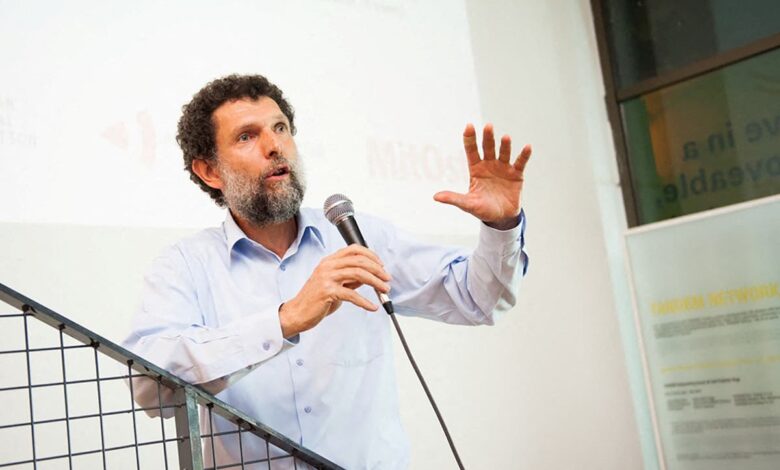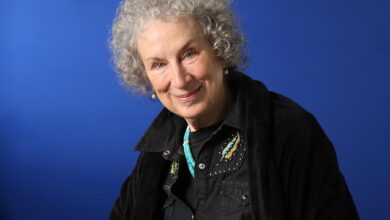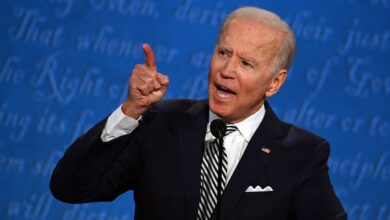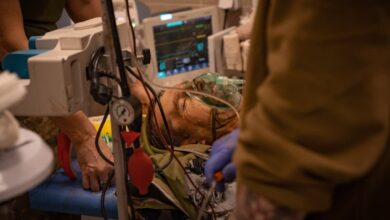Life sentence for Turkish activist sends warning to Erdogan’s opponents ahead of 2023 elections

Turkey has issued a harsh and widely condemned verdict against a respected philanthropist who earned the ire of President Recep Tayyip Erdogan with his alleged involvement in anti-government events years ago.
But the aggravated life sentence imposed on Osman Kavala, 64, and lengthy sentences on seven others by an Istanbul court late on Monday may have less to do with their past actions than with Turkey’s future.
Crucial 2023 presidential elections are on the horizon. A weakened Mr Erdogan will face off against an emboldened and increasingly popular opposition.
The life sentence against Mr Kavala, on a charge of attempting to overthrow the government, and the sentencing of seven other dissidents to 18-year prison terms were widely deemed as signals to the political elite. The message is that Mr Erdogan will seek to maintain tight controls over the political space ahead of the vote scheduled for 18 June 2023.
“Election season is approaching,” one Ankara insider told The Independent in an interview. “There’s dissolution within the state apparatus, and he’s trying to intimidate the ruling class.”
Mr Kavala has been in prison for nearly five years without any verdict and despite an order by the European Court of Human Rights, to which Turkey is a signatory, to release him.
He was first accused of organising 2013 protests against Mr Erdogan’s decision to revamp Istanbul’s Gezi Park. The demonstrations escalated into a nationwide year-long movement against the leader’s increasingly authoritarian rule.
A court later dismissed the Gezi Park charges and ordered him released. He was immediately re-arrested on charges of taking part in a 2016 coup attempt against Mr Erdogan. That violent debacle has been attributed to the movement of an Islamic cult leader who despised Mr Kavala and his elite segment of Turkish society.
Amnesty International said the Kavala case “defies all logic” and that “prosecuting authorities have repeatedly failed to provide any evidence that substantiates the baseless charges of attempting to overthrow the government.”
The prosecution has attracted worldwide attention, although the UK’s Foreign Commonwealth and Development Office (FCDO) has been mum. After the verdict, the US State Department issued a statement of condemnation that was unusual in its length and detail.
“His unjust conviction is inconsistent with respect for human rights, fundamental freedoms, and the rule of law,” said Ned Price, spokesman for the State Department. “We remain gravely concerned by the continued judicial harassment of civil society, media, political and business leaders in Turkey.”
In February, the Council of Europe launched infringement proceedings against Turkey over its failure to release Mr Kavala. That process could lead to Ankara’s expulsion from the body.
Then in October, Mr Erdogan nearly sparked a major diplomatic crisis after threatening to expel diplomats from nearly a dozen countries that issued a statement calling for Mr Kavala’s release.
International officials with contacts deep inside Mr Erdogan’s government have sought to lobby the president for the release of Mr Kavala. They have come away empty-handed. Mr Erdogan last year called Mr Kavala “Soros scum,” referring to American philanthropist George Soros, who conspiracy theorists believe was behind the colour revolutions that brought down dictatorships in eastern Europe.
Class resentments may be at the root of Mr Erdogan’s animosity. Unlike Mr Kavala, who was the scion of a wealthy and highly educated family, Mr Erdogan, 68, grew up relatively poor in a working class district of Istanbul.
File photo: Turkey’s President Recep Tayyip Erdogan addresses media representatives during a press conference at an European Union (EU) summit at EU Headquarters in Brussels on March 24, 2022
“He holds personal grudges,” says Nevsin Mengu, an independent Istanbul-based political journalist and columnist. “He’s been holding this personal grudge for many years.”
But many analysts say the harsh ruling is meant to tighten the political space ahead of elections. Repeated polls show Mr Erdogan losing to several opposition figures—including Istanbul mayor Ekrem Imamoglu, Ankara mayor Mansur Yavas, and centre-left opposition party Kemal Kilicdaroglu in a head-to-head matchup.
Support for his Justice and Development Party (AKP) and its far-right junior partner has fallen to under 40 per cent amid an economic crisis, inflation and unemployment. Already top civil servants and officials have begun building ties with the opposition ahead of what they perceive may be a massive change. Despite political pressures, one judge in the three-judge panel which sentenced Mr Kavala voted to release him, and he was acquitted of an espionage charge.
Protesters announced plans to gather Tuesday evening in front of imposing Caglayan courthouse in Istanbul where he was sentenced.
Demonstrators including lawyers and opposition lawmakers react after the verdict of jailed rights defender Osman Kavala





